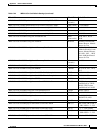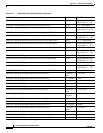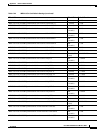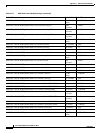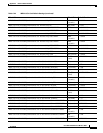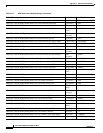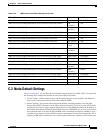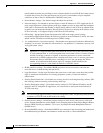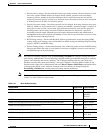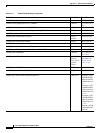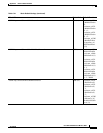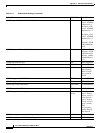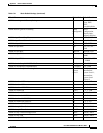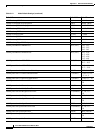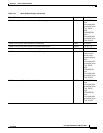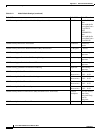
C-101
Cisco ONS 15454 Reference Manual, R8.5.x
78-18106-01
Appendix C Network Element Defaults
C.3 Node Default Settings
• Security Policy settings—Set the allowable failed logins before lockout, idle user timeout for each
user level, optional lockout duration or manual unlock enabled, password reuse and change
frequency policies, number of characters difference that is required between the old and new
password, password aging by security level, enforced single concurrent session per user, and option
to disable inactive user after a set inactivity period.
• Security Password settings—Set when passwords can be changed, how many characters they must
differ by, whether or not password reuse is allowed, and whether a password change is required on
first login to a new account; set password aging enforcement and user-level specific aging and
warning periods; set how many consecutive identical characters are allowed in a password,
maximum password length, minimum password length, minimum number and combination of
nonalphabetical characters required, and whether or not to allow a password that is a reversal of the
login ID associated with the password.
• BITS Timing settings—Set the AIS threshold, Admin synchronization status messaging (SSM),
coding, facility type, framing, state, and line build-out (LBO) settings for building integrated timing
supply 1 (BITS-1) and BITS2 timing.
• General Timing settings—Set the mode (External, Line, or Mixed), quality of reserved (RES) timing
(the rule that defines the order of clock quality from lowest to highest), revertive, reversion time,
and SSM message set for node timing.
Note Any node level defaults changed using the Provisioning > Defaults tab, changes existing node level
provisioning. Although this is service affecting, it depends on the type of defaults changed, for example,
general, and all timing and security attributes. The “Changing default values for some node level
attributes overrides the current provisioning.” message is displayed. The Side Effects column of the
Defaults editor (right-click a column header and select Show Column > Side Effects) explains the effect
of changing the default values. However, when the card level defaults are changed using the
Provisioning > Defaults tab, existing card provisioning remains unaffected.
Note For more information about each individual node setting, refer to the “Change Node Settings” chapter
of the Cisco ONS 15454 Procedure Guide.
Table C-21 Node Default Settings
Default Name Default Value Default Domain
NODE.circuits.SendPDIP TRUE TRUE, FALSE
NODE.circuits.State IS,AINS IS, OOS,DSBLD,
OOS,MT,
IS,AINS
NODE.circuits.pathprotection.AllowpathprotectionOverOnePlusOne FALSE TRUE, FALSE
NODE.circuits.pathprotection.ProvisionWorkingGoAndReturnOnPrimaryPath TRUE TRUE, FALSE
NODE.circuits.pathprotection.ReversionTime 5.0 (minutes) 0.5, 1.0, 1.5 ..
12.0
NODE.circuits.pathprotection.Revertive FALSE TRUE, FALSE
NODE.circuits.pathprotection.STS_SDBER 1.00E-06 1E-5, 1E-6, 1E-7,
1E-8, 1E-9
NODE.circuits.pathprotection.STS_SFBER 1.00E-04 1E-3, 1E-4, 1E-5



